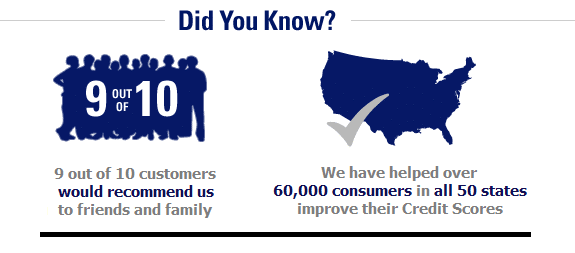How to Improve Your Credit Scores in 2020
If you found 2021 a difficult year for getting approved for credit cards, auto loans, or mortgages, or aren’t getting the best financing terms and rates, then you may want to work on improving your credit scores and make sure that 2022 is a much more prosperous year.
Improving your credit scores can be time-consuming and complicated but, we have a few tips and tricks to simplify and speed up the process for you on your road toward better credit scores.
A bad credit score can cost you hundreds of thousands of dollars over the course of a lifetime and keep you from buying the house or car that you deserve. That is why the process of improving your credit is especially important and worth the investment.
Lots of consumers struggle to increase their credit scores but, with a little knowledge, your credit journey can lead you toward the achievement of your credit goals, allowing you to enjoy everything that comes with having good credit.
1. Pay Your Bills On-Time
This goes without saying but, we’ll say it anyway. New late payments and derogatory information in your credit reports will derail your chances at a better credit score.
It’s important to pay your bills on time, every month, and put together a perfect payment history from this day forward. Payment history accounts for approximately 35% of your credit score so, make a commitment to paying all of your bills on time in 2022.
Put together a billing schedule that includes all of your monthly bills to keep yourself on track or set up auto-pay or reminders in your calendar.
Do whatever you have to do in order to make sure that you don’t miss even one payment in 2022 and have a perfect payment history going forward.
2. Pay Down Your Credit Cards
Approximately 30% of your credit score is aggregated from your active credit utilization. Basically, it’s the percentage of credit that you are using in relation to your total available credit.
If you consider that the average FICO Score ranges from 300 to 850, that means that your credit utilization accounts for approximately 165 points.
Now, if you do a little research, you will find that most companies typically tell consumers to keep their credit utilization below 30%. This means that if the credit limit on your credit card is $1,000 – your balance should be $300 or less. Having said that, FICO doesn’t actually disclose the proper utilization percentage for consumers. They basically only give 2 guidelines; keep your credit card balances as low as possible and don’t carry $0 balances to get the most out of your credit scores.
FICO releases data on what they call “FICO Score High Achievers” every year, these are consumers with FICO Scores of 780 or higher. For last year, the average credit utilization for a FICO Score High Achiever was 5.8%. ($58 balance for every $1,000 credit limit).
Ultimately, if you can pay your credit cards down to a 30% utilization – great! If you can get it down to 20% – even better! 10% utilization – better yet!
But, work on paying down your credit cards and your credit scores will increase.
3. Establish Credit
If you don’t have any active or open credit – you’re missing a huge opportunity to increase your credit scores. Revolving credit (credit cards) is a very important factor in the calculation of your credit scores.
Having an active credit card that you pay on time every month impacts your payment history (35% of your credit score), your credit utilization (30% of your credit score), and your length of credit history (15% of your credit score).
If you’ve had credit issues in the past, a new credit card will help to show future lenders that you have turned over a new leaf and started managing your credit more responsibly. Just pay your card on time, keep a low credit utilization, and don’t close the account, and your credit scores will go up.
If your credit score isn’t high enough to help you qualify for a regular (unsecured) credit card, try applying for a secured credit card.
4. Build a Long Length of Credit History
Your length of credit history, in particular, the average age of your open accounts, represents approximately 15% of your overall credit score. Ideally, you want to keep your accounts open for as long as possible and establish a long length of credit.
Constantly opening and closing accounts might seem like a good idea if you keep getting better terms like lower interest rates and higher credit limits but, this process will actually shorten your length of credit history and end up lowering your credit scores.
If your length of credit history is short and the average age of your open accounts is less than 5 years, there’s not much that you can do to increase it quickly. You could have a friend or relative add you as an Authorized User to an old active account with a long credit history but, other than that, the best thing that you can do is establish your credit, keep your oldest accounts open, and refrain from opening up too many new accounts.
5. Limit Your Inquiries
Inquiries are a record of your applications for credit and account for approximately 10% of your credit scores. Too many applications within a short period of time will decrease your credit scores.
Limit yourself to no more than 1 inquiry every 6 months to get your scores as high as possible.
If you have too many inquiries reporting on your credit reports right now, you can either wait for them to fall off your reports themselves (inquiries report for 2 years) or work on removing them from your credit reports earlier.
Inquiries fall under the permissible purpose section of the FCRA which states that every creditor reporting an inquiry on your credit report needs to have a permissible purpose (proper authorization) for the inquiry.
You can request that all of the creditors reporting inquiries provide proof of permissible purpose or hire a company like CreditFirm.net to do so on your behalf. If the credit furnisher has the proper authorization, the inquiry will stay, if they can’t verify permissible purpose, the inquiry will be deleted.
6. Make Sure Your Credit Reports Are Accurate
According to the FTC (Federal Trade Commission), 79% of credit reports contain errors and 21% of credit reports contain errors significant enough to have a substantial impact on a consumer’s credit score.
This is why it is so important that you check your credit reports from all 3 credit bureaus (Experian, Equifax, and TransUnion) at least once a year.
You can access your credit reports for FREE from annualcreditreport.com or via credit monitoring sites like Credit Karma.
Once you have your credit reports, go through them, account by account, to make sure that everything in your credit reports is 100% accurate.
Make sure that you keep an eye out for any addresses, phone numbers, accounts, or inquiries that you do not recognize – they may be a sign of a merged credit file or identity theft.
If you find any suspicious information in your credit reports make sure that you address those issues and work on removing them from your credit or hire a professional credit repair service to handle the removal of the inaccurate information on your behalf.
7. Work On Removing Negative Info From Your Reports
If you have any derogatory information reporting in your credit reports such as late payments, collections, charge-offs, repossessions, etc… you will want to work on removing them from your credit reports by leveraging consumer protection laws such as the FCRA, FCBA, FDCPA, etc….
Investigate and challenge the derogatory information with the credit bureaus, validate any debt reporting in collection, complete method of verification requests for any information verified by the credit bureaus, contact each creditor reporting the negative info directly and request goodwill removals of the derogatory info, conduct permissible purpose verification on the inquiries as stated above. Use every tool allotted to you by consumer protection laws and remove as much derogatory information as you can.
You can perform all of this work yourself but, make sure that you understand that the process takes time and can be quite time-consuming. You have to be organized, diligent, and stay on top of everything.
You can also choose to hire a professional credit repair service like CreditFirm.net to handle all of the work on your behalf, to work on removing the derogatory information and advise you on the best way to manage your credit to get the most out of your credit scores.
NOTE: If your credit score is holding you back from achieving your dreams, CreditFirm.net is here to help improve your scores and achieve your personal and financial goals.












